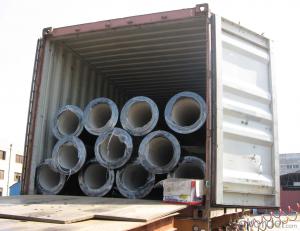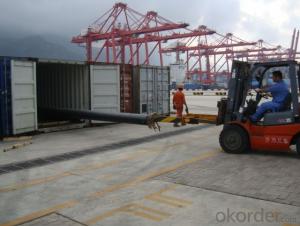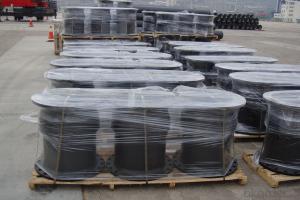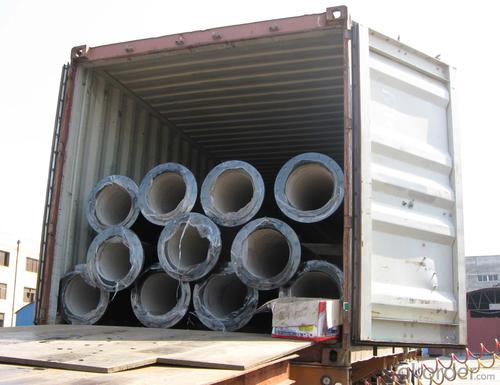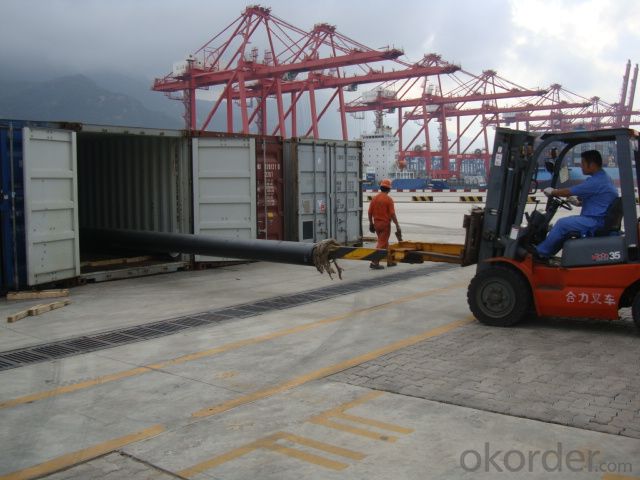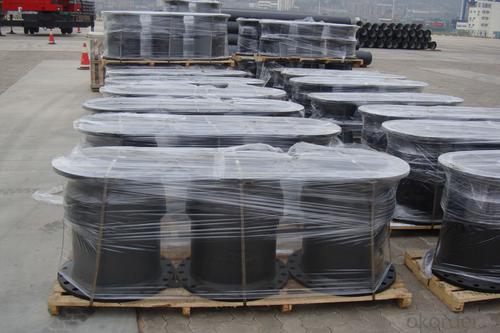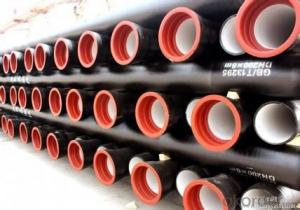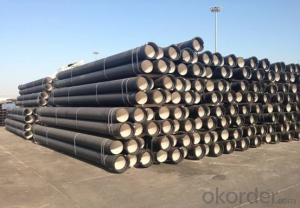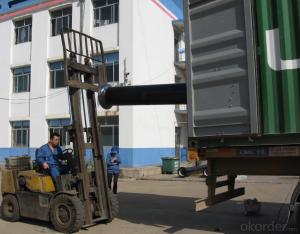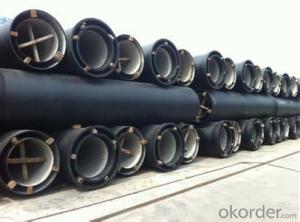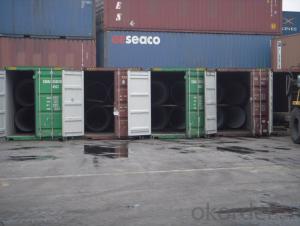DUCTILE IRON PIPES C Class DN900
- Loading Port:
- China Main Port
- Payment Terms:
- TT OR LC
- Min Order Qty:
- -
- Supply Capability:
- -
OKorder Service Pledge
OKorder Financial Service
You Might Also Like
Ductile Iron Cast Pipe is without any defects compare with tradition casting tech, which has many advantages particularly as follow:
(1) High density. In the "vertical upward casting" process, the melt iron of centre liquid column in center crystallizer is continuously feeding for volume shrinkage caused by condensation tube at outer circumference , which lead to be free of shrinkage porosity.
(2) High purity. When melt iron pouring, the mixed impurities such as gas, dross, sand grain which are lighter than melt iron could be eliminated at furnace mouth, its impossible to enter into the crystallizer through the channel, so the melt iron into the crystallizer is very pure.
(3) Strength with toughness. The cooling speed provided by continuous crystallizer is 30 times than sand casting and 5 times than centrifugal casting, and doesn't produce white iron, the eutectic cell volume of continuous cast iron is one eighth to one tenth compare with traditional cast iron. The density of graphite nodule in ductile iron can reach 300-700 pcs/mm2. Therefore, all reason above improve the strength and toughness of continuous cast iron.
(4) Free machining. The high speed cooling make the hardening phase (such as boride, steadite) not appear like reticular, massive or thick, but diffuse like fish bone and pane in shape, moreover, there are tiny graphite flakes inlaid hardening phase. It's free machining in BrinellHardness the range of 250-300HB. However, the Brinell Hardness of 250 is top limit to common metal materials.
(5) Uniform composition of tube wall. The convection mixing of liquid column caused by marching type drawing in crystallizer make the composition of tube wall well-distributed, and concentration gradient very little.
(6) High productivity. To the wall thickness of tube under 10mm, the speed of continuous casting is 1 meter/min, to the wall thickness of tube under 20mm, the speed of continuous casting is 0.5 meter/min, which is high efficiency that centrifugal or other casting tech couldn't reach.
- Q: Are ductile iron pipes resistant to hydrostatic pressure?
- Yes, ductile iron pipes are resistant to hydrostatic pressure. They have the ability to withstand high water pressure without deforming or bursting, making them a reliable choice for applications involving the transportation of water and other fluids.
- Q: What is the typical pressure rating of ductile iron pipes?
- The typical pressure rating of ductile iron pipes ranges from 150 to 350 PSI (pounds per square inch), depending on the diameter and class of the pipe.
- Q: What are the typical pressure surge protection measures for ductile iron pipe?
- Some typical pressure surge protection measures for ductile iron pipe include using surge tanks or pressure relief valves, installing air valves or surge anticipation valves, and implementing proper anchoring and support systems to minimize movement and stress on the pipe during pressure surges. Additionally, using flexible joints or expansion joints can help absorb and accommodate sudden changes in pressure.
- Q: Can ductile iron pipe be used for desalination plants?
- Yes, ductile iron pipe can be used for desalination plants. Ductile iron is a strong and durable material that has been widely used in various industries, including water and wastewater treatment plants. It offers excellent corrosion resistance, high tensile strength, and is resistant to external loads and pressures. These properties make it suitable for transporting water and other fluids in desalination plants, where there is a high concentration of salt and other corrosive elements. Additionally, ductile iron pipes are known for their long service life and low maintenance requirements, which can be advantageous for desalination plants that operate continuously and require a reliable and efficient piping system.
- Q: Do ductile iron pipes require internal linings for potable water?
- Internal linings are not required for potable water in ductile iron pipes. Ductile iron, a type of iron that has been strengthened and made more flexible, is commonly used in water distribution systems due to its durability and resistance to corrosion. Unlike cast iron or steel, ductile iron pipes have a protective cement-mortar lining. This lining acts as a strong barrier against corrosion and prevents the release of harmful substances into the water. It is applied during the manufacturing process and is designed to withstand the corrosive properties of potable water, eliminating the need for internal linings. Furthermore, the smooth surface of ductile iron pipes ensures the quality and flow of water without the necessity of additional linings.
- Q: How to control mortar proportioning in ductile iron pipe cement coating
- The calculation steps are: first to calculate the amount of plastering engineering (area), and then check the "national construction basic quota" quota in the corresponding amount of mortar project, engineering quantity multiplied by the amount of mortar that fixed amount of mortar, the mortar amount multiplied by the corresponding mix ratio of mortar, the consumption of raw materials can be obtained.
- Q: Can the underground cast iron pipes be connected with clamps to form buttress?
- The hoop has the advantages of beautiful appearance, convenient operation, strong clamping force, good sealing performance, etc.. Mainly used for connecting and fastening vehicle, ship, diesel engine, gasoline engine, machine tools, fire, and other machinery and equipment, chemical equipment general nylon hose, plastic hose, hose cloth, water interface and seal etc..
- Q: Can ductile iron pipes be used in gravity sewer systems?
- Yes, ductile iron pipes can be used in gravity sewer systems. Ductile iron pipes are known for their strength, durability, and resistance to corrosion, making them suitable for carrying wastewater under gravity flow conditions.
- Q: How do ductile iron pipes perform in high-velocity water flow conditions?
- Ductile iron pipes perform exceptionally well in high-velocity water flow conditions. Due to their unique composition and manufacturing process, ductile iron pipes exhibit superior strength and durability, making them highly resistant to the forces generated by high-velocity water flow. These pipes are specifically designed to withstand significant hydraulic pressure and turbulent conditions. Their inherent ductility allows them to absorb the energy of the flowing water and effectively dissipate any potential stress or impact that may occur. Additionally, the smooth internal surface of ductile iron pipes minimizes frictional losses, enabling efficient water flow even at high velocities. This characteristic is crucial in maintaining the required water pressure and flow rates in applications such as water distribution systems, sewage networks, and industrial processes. Moreover, the corrosion resistance of ductile iron pipes further enhances their performance in high-velocity water flow conditions. These pipes are typically lined with cement mortar or polyethylene, which provides an additional layer of protection against the corrosive effects of fast-flowing water. Overall, ductile iron pipes are well-suited for high-velocity water flow conditions, offering exceptional strength, durability, and hydraulic efficiency. Their ability to withstand the challenges posed by fast-flowing water makes them a reliable choice for a wide range of applications where high water velocity is a concern.
- Q: What is the average weight of ductile iron pipe?
- The average weight of ductile iron pipe varies depending on the size and thickness of the pipe. However, on average, ductile iron pipes can weigh between 300 to 600 pounds per linear foot.
Send your message to us
DUCTILE IRON PIPES C Class DN900
- Loading Port:
- China Main Port
- Payment Terms:
- TT OR LC
- Min Order Qty:
- -
- Supply Capability:
- -
OKorder Service Pledge
OKorder Financial Service
Similar products
Hot products
Hot Searches
Related keywords
